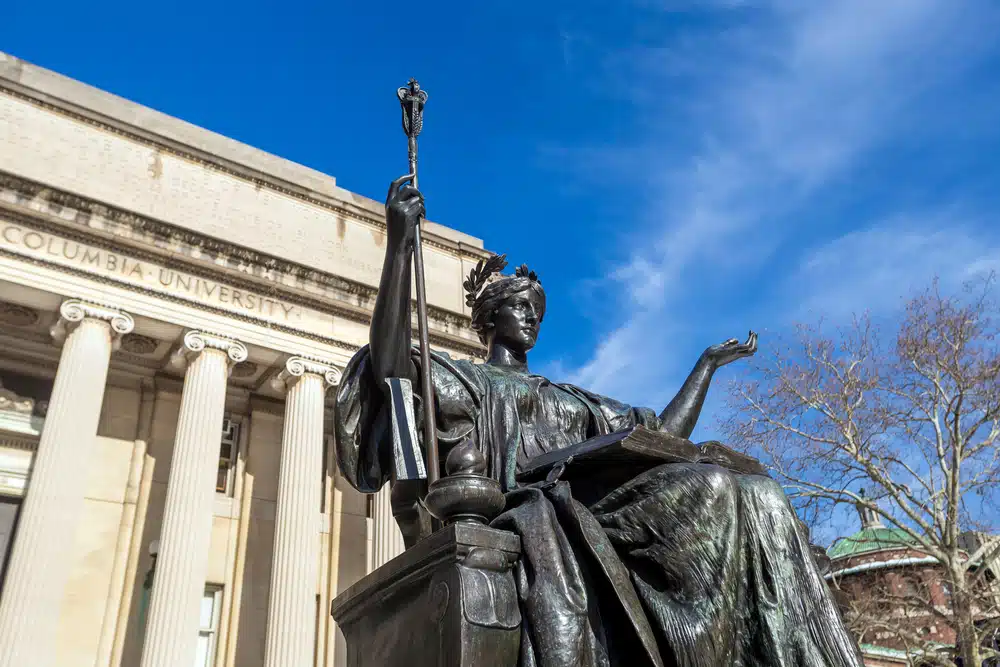Meeting Columbia University’s Undergraduate Requirements
As a pillar of educational excellence, Columbia University offers a rigorously academic and culturally diverse environment. Understanding Columbia’s undergraduate requirements is critical to a successful application process. This article serves as a comprehensive guide.
Understanding Columbia University’s Admission Standards
Columbia University, situated in the heart of New York City, is a highly competitive institution globally renowned for its academic standards. To navigate this competitive admission process, applicants must understand what the university seeks in prospective students.
When it comes to Columbia University’s admission standards, there are several vital factors that applicants should consider. These factors include the importance of a high school curriculum, standardized test scores, and the role of extracurricular activities.
The Importance of High School Curriculum
One of Columbia’s undergraduate requirements is a strong high school curriculum background. Columbia University strongly emphasizes a solid high school curriculum showcasing the students’ academic prowess and discipline. The university particularly appreciates students who have challenged themselves with advanced placement (AP) or international baccalaureate (IB) courses.
By taking advanced courses, students demonstrate their ability to handle rigorous academic material and go above and beyond the standard curriculum. This shows a commitment to learning and prepares students for the academic challenges they will face at Columbia University.
In addition to advanced courses, the high school GPA often reflects the students’ consistent effort and dedication toward their studies. Consequently, a high GPA is highly prized in the Columbia University admission process. Admissions officers look for applicants who have excelled academically and have a track record of success.
Standardized Test Scores: SAT and ACT
In addition to the high school GPA, Columbia University also evaluates standardized test scores as an undergraduate requirement. These scores provide a standardized measurement of a student’s academic abilities compared to other students nationally. Both SAT and ACT scores are considered in the admission process.
While no specific minimum SAT or ACT score is required for admission, high scores can substantially increase the likelihood of acceptance. Admissions officers use these scores to assess applicants’ aptitude in critical reading, writing, and mathematics.
It is vital for applicants to dedicate time to prepare for these standardized tests. Regular preparation and practice can yield significantly improved scores, making applicants more competitive in the admission process.
The Role of Extracurricular Activities
While academic achievements are crucial, Columbia University is equally interested in well-rounded individuals with varied interests. Therefore, extracurricular activities play a pivotal role in Columbia’s undergraduate requirements.
Engaging in extracurricular activities demonstrates students’ ability to balance their academic responsibilities with other commitments. Involvement in clubs, sports, volunteering, part-time jobs, or advanced research projects provides an edge to prospective students. These activities exhibit desirable leadership, teamwork, and commitment to various causes.
Admissions officers at Columbia University value applicants who have positively impacted their communities and shown a genuine passion for their interests outside of the classroom. These activities showcase an applicant’s character and contribute to the diverse and vibrant campus community that Columbia University strives to cultivate.
Understanding Columbia University’s admission standards is essential for prospective students who aspire to join this prestigious institution. By focusing on a solid high school curriculum, achieving high standardized test scores, and actively participating in extracurricular activities, applicants can enhance their chances of admission to Columbia University.
Navigating the Application Process
Mastering the application process is instrumental for prospective Columbia University students. It encompasses several components, each carrying significant weight in the selection process.
When applying to Columbia University, there are many factors to consider. From crafting a compelling personal statement to securing solid letters of recommendation, each step plays a crucial role in determining the outcome of an application.
Crafting a Compelling Personal Statement
The personal statement is the applicant’s chance to share their story in their own words. This is an opportunity to highlight personal achievements, struggles, and aspirations. Crafting a personal narrative that resonates with the application panel can significantly impact the application’s outcome.
When writing a personal statement, it is crucial to be authentic and genuine. Admissions officers seek applicants who can effectively communicate their experiences and motivations. A piece of successful personal information is precise and captivating and sheds light on the applicant’s character, drive, and potential for success at Columbia University.
It is essential to take the time to reflect on one’s experiences and goals before beginning the writing process. By carefully considering what makes them unique and what they hope to achieve at Columbia University, applicants can create a personal statement that stands out.
Securing Strong Letters of Recommendation
Letters of recommendation offer a distinctive outside perspective on the applicant’s academic and personal competencies. Preferably, these letters should be procured from individuals who can substantiate the applicants’ abilities, such as high school teachers or work supervisors.
When requesting letters of recommendation, choosing individuals who know the applicant well and can speak to their strengths is essential. An impactful recommendation letter offers specific examples and anecdotes highlighting the applicant’s standout personal traits and achievements.
It is also crucial to give recommenders ample time to write the letters. Providing them a clear understanding of the applicant’s goals and experiences can help them craft a more personalized and compelling recommendation.
The Significance of the Application Interview
The application interview is a vital platform for applicants to make a lasting impression on the admissions committee.
Preparing for the application interview is essential. Applicants should research Columbia University thoroughly, familiarizing themselves with the programs, faculty, and campus culture. This knowledge will allow them to demonstrate their enthusiasm for the university and articulate why they are a good fit.
Practicing mock interviews can also be beneficial. By rehearsing potential questions and answers, applicants can become more comfortable with the interview process and develop strategies for handling challenging questions with ease.
During the interview, being confident, articulate, and genuine is essential. Applicants should strive to convey their passion for their chosen field of study and commitment to academic excellence.
Prospective Columbia University students can increase their admission chances by mastering the application process. Crafting a compelling personal statement, securing solid letters of recommendation, and excelling in the application interview are all crucial steps to success.
Financial Considerations for Prospective Students
Aside from Columbia’s undergraduate requirements, financial considerations are significant when planning undergraduate studies. It is essential for prospective students and their families to clearly understand the financial obligations and opportunities that come with pursuing a degree at this prestigious institution.
Attending Columbia University, as a leading Ivy League university, requires a substantial financial investment. Tuition fees, accommodation, meals, books, travel, and personal expenses are part of the overall cost of obtaining an undergraduate degree. It is crucial for students and their families to plan and budget accordingly to cover the entire duration of the degree program.
When financing their education, prospective students should explore the various scholarship opportunities and financial aid options available at Columbia University. The university operates a need-based financial aid policy and is committed to meeting 100% of all admitted first-year students’ demonstrated financial needs. This means that financial aid is available to those who qualify and can significantly ease the burden of tuition and associated study costs.
Numerous scholarships, grants, work-study options, and loan programs are available to help offset the costs of attending Columbia University. Investing time in researching and applying for these opportunities is a profitable venture. By taking advantage of financial aid, students can focus more on their studies and extracurricular activities rather than worrying about the financial strain of their education.
It is important to note that applying for financial aid can be complex and time-consuming. Therefore, prospective students should start early and gather all the information and documentation required for their financial aid applications. This includes completing the Free Application for Federal Student Aid (FAFSA) and any additional forms or documents the university requests.
Students should also consider exploring external scholarship opportunities offered by organizations, foundations, and corporations. These scholarships can provide additional financial support and help reduce the overall cost of attending Columbia University.
Ultimately, while the financial considerations for prospective students at Columbia University may seem daunting, it is essential to remember that the university is committed to making education accessible and affordable for all admitted students. By taking advantage of the available financial aid options and scholarships, students can pursue their academic goals at one of the most prestigious institutions in the world without being overwhelmed by the financial burden.
Life as a Columbia University Undergraduate
Beyond the academics and financial considerations, life at Columbia University is an enriching and transformative experience. Let’s dive deeper into what makes being an undergraduate student at Columbia University so unique.
Academic Life and Opportunities
Undergraduate students at Columbia University can access various academic resources and enrichment opportunities. The university’s intellectual life extends beyond the classroom to include a variety of research opportunities, study abroad options, and internships.
Imagine having the chance to work alongside world-renowned professors who are at the forefront of their fields. At Columbia University, this has become a reality. The university’s commitment to academic excellence ensures students are exposed to cutting-edge research and innovative ideas.
Furthermore, Columbia University’s location in the heart of New York City provides students with unparalleled access to industry leaders and professionals. The city becomes an extension of the classroom, offering endless opportunities for internships and networking.
Being a part of Columbia University also allows students access to an expansive network of professionals and leaders in various disciplines, paving the way for doors of opportunities to open. Whether through alumni connections or industry partnerships, students are well-equipped to embark on successful careers upon graduation.
Campus Life and Student Services
Fostering an inclusive and vibrant community, Columbia University’s campus life is replete with opportunities for student engagement. Over 500 student clubs cater to diverse interests, including the arts, advocacy, athletics, and more.
Imagine joining a club that aligns with your passion, whether it’s a cappella singing, social justice, or even Quidditch. These clubs provide a sense of belonging and offer opportunities for leadership development and personal growth.
The university also offers various student services, such as counseling and mental health support, career services, and academic advising to help students navigate their university years easily. The dedicated staff and resources ensure that students have the support they need to thrive academically, emotionally, and personally.
Additionally, Columbia University hosts various events and activities throughout the year, including lectures, performances, and cultural celebrations. These events foster a sense of community and allow students to explore new interests and broaden their horizons.
Housing and Dining Options at Columbia University
Columbia University extends a variety of housing and dining options to meet the varied preferences of students. All undergraduate students are guaranteed four-year housing in one of the iconic Columbia residence halls.
Living on campus allows students to immerse themselves in the vibrant community and forge lifelong friendships. The residence halls offer a supportive and inclusive environment where students can thrive academically and socially.
The university also offers multiple dining facilities serving various cuisines catering to different dietary preferences and needs. From international flavors to comfort food, there is something for everyone. These dining options nourish the body and serve as social hubs where students can connect and build relationships.
Obtaining a spot at Columbia University is a rigorous process. However, prospective students can find their place at this esteemed institution with adequate preparation, commitment, and determination. Once there, they will be immersed in a world of academic excellence, vibrant campus life, and endless personal and professional growth opportunities. Columbia University offers an extraordinary undergraduate experience that prepares students for success in their chosen paths.
If you want to discuss Columbia’s undergraduate requirements to a greater extent or inquire about college admissions, look no further! Our experts here at AdmissionSight can help you! Here at AdmissionSight, we have over a decade’s worth of experience guiding students through the competitive admissions process to get accepted to the top universities in the world. Feel free to set up an appointment today to book your initial consultation.








































